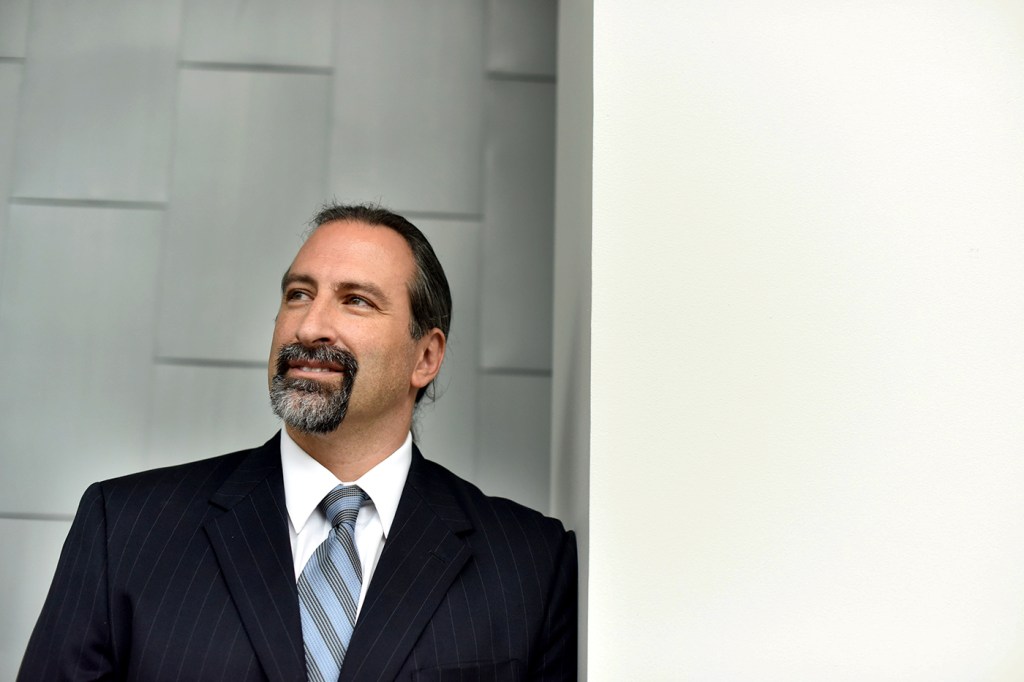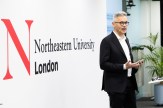New professor has made crime prevention his life’s work

Anthony Braga has been working in conjunction with the Boston Police Department for more than 20 years, analyzing policies and developing programs aimed at reducing the city’s violent crime rate.
“I originally wanted to become a police officer,” says Braga, who joined Northeastern’s faculty in July as Distinguished Professor and director of the School of Criminology and Criminal Justice. “But as I progressed through my academic career, I realized that working with criminal justice, social service, and community-based organizations to understand and address complicated crime problems was the perfect fit for me.”
As a research associate at Harvard University’s John F. Kennedy School of Government in the mid-90s, Braga and two of his colleagues spearheaded the design, implementation, and analysis of a gang violence reduction initiative known as Operation Ceasefire. In partnership with the BPD, Boston’s Ten Point Coalition, and many other community stakeholders, Braga and his research partners used a carrot-and-stick approach to deter the violent behavior of some 1,300 chronically offending gang members, who accounted for more than half of the city’s youth homicides from 1990 to 1994. They found that the implementation of the initiative was associated with a 63 percent decrease in the monthly number of youth homicides in Boston from 1996 to 1998, prompting other cities such as Chicago, Los Angeles, and New Orleans to replicate the strategy.
“Our approach was fair and transparent to the community,” recalls Braga, now a leading expert in policing and crime prevention. “It wasn’t about rounding up a bunch of poor, young men who had grown up in difficult circumstances. It was about halting violence while offering job training and other social services to those who wanted to turn their lives around.”
About a decade later, Braga took on a more prominent role within the BPD. From 2007 to 2013, he served as chief policy adviser to former Boston Police Commissioner Edward F. Davis, working with his command staff and line-level officers to create, implement, and analyze a number of community policing initiatives. One of them—the Safe Street Teams program, which was implemented in 2007—was designed to reduce violent crime by assigning teams of BPD officers to targeted crime hot spots in the city, including Orchard Park, Eagle Hill, and Downtown Crossing. The intervention worked, leading to a 17 percent reduction in the number of total violent crimes at targeted sites relative to those that officers had not been specifically assigned to.
“I feel very fortunate to have had the opportunity to work with the BPD and their partners for most of my career,” says Braga, who was recently tapped to help implement and analyze its six-month body camera pilot program. “It has certainly been an enriching experience to learn directly from people who are serving the public and working tirelessly to keep Boston’s communities safe.”
We have a very impressive faculty, excellent students, and a reputation for rolling up our sleeves and working in partnership with criminal justice agencies and community-based organizations to solve problems.
— Anthony Braga, Distinguished Professor and director of the School of Criminology and Criminal Justice
Throughout his illustrious career, Braga has received more than a dozen prestigious awards for his efforts to reduce violence in disadvantaged neighborhoods. They include the Boston Foundation’s 2004 Civic Leadership Award; the U.S. Attorney General’s 2009 Award for Outstanding Contributions to Community Partnerships for Public Safety; and the International Association of Chiefs of Police’s 2010 Excellence in Law Enforcement Research Award.
He has published more than 80 scholarly journal articles, 50 book chapters, and dozens of commentaries, editorials, and monographs. His fourth book—titled The Wrong Hands: Denying Criminal Access to Firearms Through Market Intervention—is scheduled to be released in the summer of 2017.
Braga comes to Northeastern from Rutgers University, where he most recently served as the Don M. Gottfredson Professor of Evidence-Based Criminology. He earned his doctorate in criminal justice from Rutgers in 1997 and his master of public administration from Harvard University in 2002.
He chose Northeastern for its focus on interdisciplinary research and collaboration. “Persistent crime problems have multiple causes,” he says, “and developing a deep understanding of the underlying conditions that trigger them requires an interdisciplinary approach.”
He notes that he’s looking forward to working with faculty across the university, including those in the School of Law and the Bouvé College of Health Sciences. And he’s already solidified research partnerships with several of his colleagues in the School of Criminology and Criminal Justice, among them Jack McDevitt, Glenn Pierce, Brandon Welsh, and Gregory Zimmerman. For one project, Braga, McDevitt, and Zimmerman have received a $500,000 grant from the city of Oakland, California, to evaluate its gang violence reduction strategy. “We have a very impressive faculty, excellent students, and a reputation for rolling up our sleeves and working in partnership with criminal justice agencies and community-based organizations to solve problems,” Braga says. “It’s incredibly exciting.”





